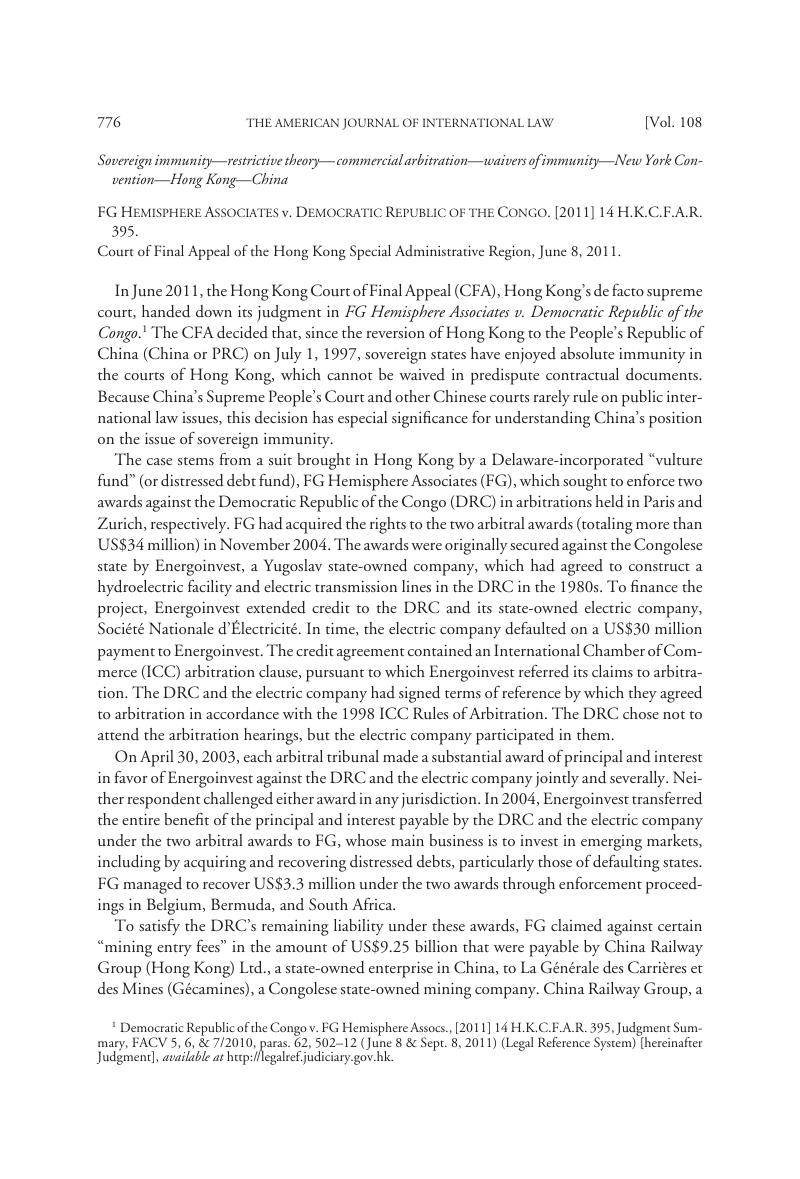Published online by Cambridge University Press: 20 January 2017

1 Democratic Republic of the Congo v. FG Hemisphere Assocs., [2011] 14 H.K.C.F.A.R. 395, Judgment Summary, FACV 5, 6, & 7/2010, paras. 62, 502–12 (June 8 & Sept. 8, 2011) (Legal Reference System) [hereinafter Judgment], available at http://legalref.judiciary.gov.hk.
2 Democratic Republic of the Congo v. FG Hemisphere Assocs., [2010] 2 H.K.L.R.D. 66, CACV 373/2008 & CACV 43/2009 (Feb. 10, 2010) (Legal Reference System), available at http://legalref.judiciary.gov.hk [hereinafter CA Judgment Feb. 10, 2010].
3 Relevant cases included Midland Inv. Co. v. Bank of Commcns, [1956] 40 H.K.L.R. 42, 48; Wallen [Wallem] Shipping (Hong Kong) Ltd. v. Owners of the Ship “Philippine Admiral,” [1974] H.K.L.R. 111, 145.
4 O’Brien, Roderick, Sovereign Immunity and the People’s Republic of China, 13 Hong Kong L. J. 202 (1983)Google Scholar.
5 CA Judgment Feb. 10, 2010, para. 122.
6 See Basic Law, Arts. 8, 160 (H.K.); Decision Concerning the Handling of the Laws Previously in Force in Hong Kong in Accordance with Article 160 of the Basic Law of the Hong Kong Special Administrative Region of the People’s Republic of China (promulgated by the Standing Comm. Nat’l People’s Cong. Feb. 23, 1997), translated in 1997 P.R.C. Laws 319; Interpretation and General Clauses Ordinance, No. 110, (1997) 1 O.H.K., §2A(1).
7 Basic Law, Arts. 13, 18, para. 3, & 158, para. 3.
8 Id., Art. 19, para. 3.
9 Procedurally, the courts of Hong Kong are bound to determine questions of fact concerning acts of state in accordance with a certificate issued by the Hong Kong chief executive based on a certifying document from the Central People’s Government of China.
10 Basic Law, Art. 2; see also id., Art. 19, para. 1.
11 Id., Art. 158, para. 1.
12 Id., para. 2.
13 Id., para. 3.
14 Buttes Gas & Oil Co. v. Hammer (Nos. 2 & 3), [1982] A.C. 888 (H.L.), 932 (Lord Wilberforce).
15 Letter from the PRC Office of the Commissioner of Foreign Affairs to Constitutional and Mainland Affairs Bureau of the HKSAR Government (Nov. 20, 2008), quoted in Judgment, para. 197 (majority op.). This letter was sent at the time of the proceedings in the high court. The second letter was meant for the proceedings in the court of appeal and was dated May 21, 2009. The third letter was directed to the proceedings in the CFA and was dated Aug. 25, 2010.
16 United Nations Convention on the Jurisdictional Immunities of States and Their Property, GA Res. 59/38 (Dec. 2, 2004) (not yet in force) [hereinafter UN State Immunities Convention].
17 FG Hemisphere Assocs. v. Democratic Republic of the Congo, [2009] 1 H.K.L.R.D. 410 (C.F.I.), HCMP 928/2008 (Dec. 12, 2008), quoted in Judgment, para. 201 (majority op.).
18 Jackson v. People’s Republic of China (Hukuang Railway Bonds), 596 F. Supp. 386 (N.D. Ala, 1984), aff’d, 794 F.2d 1490 (11th Cir. 1986). For the Ministry of Foreign Affairs’ aide-mémoire in that case, see 22 ILM 81 (1983).
19 Jin, Huang & Jingsheng, Ma, Immunities of States and Their Property: the Practice of the People’s Republic of China, 1988 Hague Y. B. Int’l L. 163, 165–66.Google Scholar
20 Houli, Wang, Sovereign Immunity: Chinese Views and Practices, 1 J. Chinese L. 23 (1987)Google Scholar.
21 Dong Wang, China’s Unequal Treaties: Narrating National History 2 (2005) (claiming that from 1840 to 1943 China and foreign countries had concluded between five hundred and one thousand treaties, agreements, and conventions that contained unequal provisions).
22 After the United States, China has the world’s second largest concentration of Global Fortune 500 companies, and over half of the Chinese companies in this list are state-owned enterprises. Lin, Li-Wen & Milhaupt, Curtis J., We Are the (National) Champions: Understanding the Mechanisms of State Capitalism in China, 65 Stan. L. Rev. 697, 699 (2013)Google Scholar.
23 China’s official statistics indicate that China’s outbound investment reached US$435.49 billion by the end of 2012 and 59.8% of this amount was invested by the state-owned enterprises. Ministry of Commerce, State Statistics Bureau and State Administration of Foreign Exchange, Statistical Report of China’S Outbound Investment in 2012, at 4, 19 (China Statistics Press 2013) (in Chinese).
24 International Chamber of Commerce, Rules of Arbitration, Rule 28(6) (entered into force Jan. 1, 1998), at http://www.icc.se/skiljedom/rules_arb_english.pdf.
25 China’s judicial practice on state immunities has been limited. 2 Jerome Alan Cohen & Hungdah Chiu, People’s China and International Law: A Documentary Study, pt. VII (1974).
26 Sucharitkul, Sompong, Jurisdictional Immunities in Contemporary International Law from Asian Perspectives, 4 CHINESE J. Int’l L. 1, 8 (2005)CrossRefGoogle Scholar.
27 Convention on Recognition and Enforcement of Foreign Arbitral Awards, June 10, 1958,21 UST 2517, 330 UNTS 3.
28 This ruling appears to be reasonable and legitimate. States cannot be bound by a waiver in an arbitration agreement between private parties to which they have not consented (unless of course the party to the agreement was explicitly authorized to bind the state). By contrast, a sovereign state may not assert state immunity ratione materiae if its being bound by a treaty is deemed to be explicit consent not to invoke immunity from jurisdiction. In this scenario, the well-established principle cannot be circumvented. Immunity ratione materiae is lost when the sovereign state ratifies the treaty, which may deprive that state of its right to object to the assertion of extraterritorial jurisdiction by another state. This subtle difference was illustrated in Regina v. Bow St. Metro. Stipendiary Magistrate, ex parte Pinochet (No. 3), [1999] UKHL 17, [2000] 1 A.C. 147, and Int’l Ins. Co. v. Caja Nacional de Ahorro y Seguro, 293 F.3d 392, 397 (7th Cir. 2002).
29 UN State Immunities Convention, supra note 16, Art. 17.
30 E.g., European Convention on International Commercial Arbitration, Arts. 1,2,3, Apr. 21, 1961, 484 UNTS 364.
31 For a discussion of this issue on the basis of analogous facts, see Creighton Ltd. v. Government of Qatar, 181 F.3d 118 (D.C. Cir. 1999).